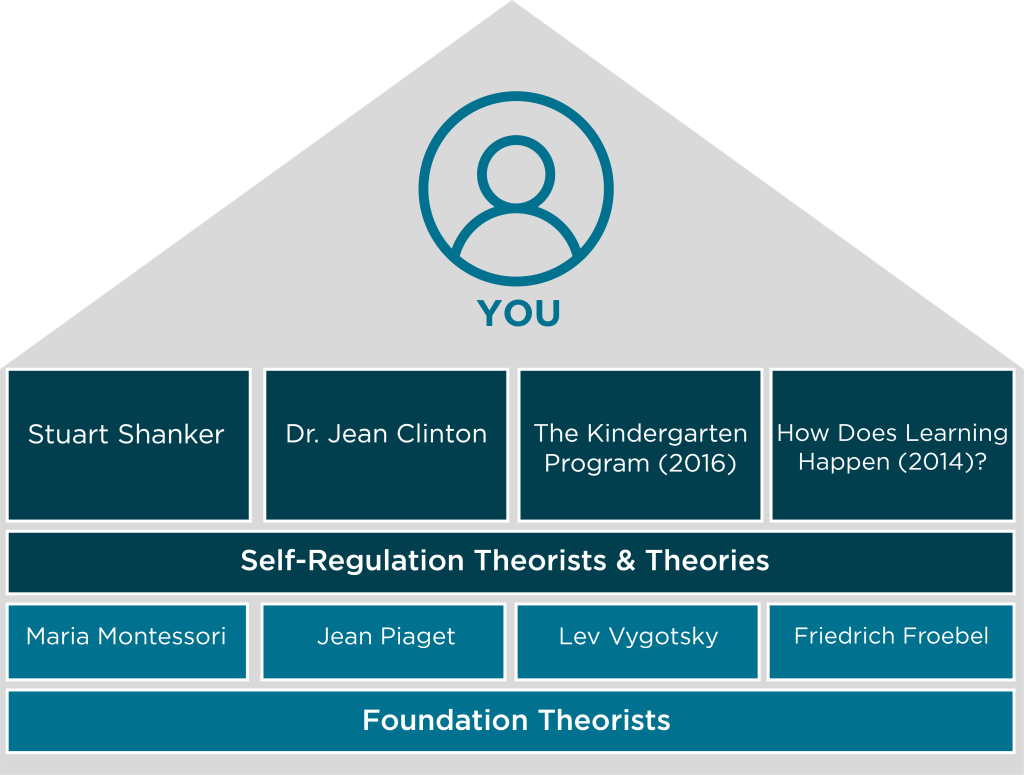Preface: Theorists & Theoretical Perspectives
ECE5J Course Learning Outcomes
- Demonstrate knowledge of educational perspectives in early childhood education.
- Demonstrate an understanding of strategies to support families from a theoretical perspective.
Education continually builds upon the platforms of ideas and theorists. It is everchanging and continuously evolving as new ideas emerge. Education can be considered a building block of knowledge, and as our knowledge grows, we continue to build upon the blocks of knowledge before us.
It is important to reflect upon the ideas of theorists and theories to understand the blocks of knowledge that form our current tower.
We will be looking into the following blocks of knowledge that form the base. The foundational theorists are Maria Montessori, Jean Piaget, Lev Vygotsky, and Friederich Frobel.
Interactive Navigation: Scroll down on each hotspot to read all of the content.
Foundational Theorists
Maria Montessori
- Believed in hands-on learning and fostering application skills.
- Created a philosophy of education that learning should be about children’s interests and personalized, rather than traditional formal education.
- Promotes choice in learning.
Jean Piaget
- Believed in the importance of the environment in children’s learning.
- Believed children move through 4 stages of learning: sensorimotor, preoperational, concrete operational, and formal operational.
- Believed that children learn through their environment and described children as ‘little scientists.”
Lev Vygotsky
- Coined the Zone of Proximal Development- a theory that describes how adults scaffold a child’s learning.
- Provides an understanding of how educators should interact with and support a child in their learning.
- The Zone of Proximal Development theory and scaffolding are still used today.
Friederich Frobel
- Believed that children learn best through play.
- Believed children learn best through hands-on experiences.
- His theories are catalysts in the play-based model of education.
These theorists and their theories have informed our current philosophies of education and impacted education as a whole. Education is continually evolving and building upon the ideas before us.
Self-Regulation Theorists & Theories
Similarly, some current theorists and perspectives have emerged out of these previous concepts, based specifically on the concept of self-regulation.
These theorists have built upon the previous blocks of knowledge:
Stuart Shanker
- Coined the Shanker Self-Reg framework, which aims to help individuals understand self-reg and stress among five domains (biological, emotional, cognitive, social and prosocial).
- Specifically, it distinguishes the differences between self-control and self-regulation.
Dr. Jean Clinton
- Dr. Clinton is a child psychiatrist who believes in the power of relationships in the development of a child’s brain.
- Believes in the power of relationships and connecting on self-regulation.
The Kindergarten Program (2016)
- Ontario Ministry of Education Kindergarten Program focuses on the importance of self-regulation in children and provides theoretical frameworks for implementing self-regulation concepts.
- Supports the development of self-regulation in education.
How Does Learning Happen? (2014)
- Ontario’s Pedagogy for the Early Years.
- Self-regulation is discussed within the Well-Being Foundation.
- Identifies that “Self-regulation is different from self-control or compliance. Self-regulation is about how a child can deal effectively with stressors and then recover.” (Ontario Ministry of Education,2014, p. 30).
These self-regulation theorists provide the foundation for our book, and throughout this book, we will dive deep into some of these concepts, building upon the ideas of theorists before us.
Our goals in developing this textbook are for you to engage in the content, develop a greater understanding of self-regulation, and how to implement it in education.
Let’s build your block of knowledge!

Image Description
The image depicts a graphic shaped like a house, with different names and theories organized in a structured hierarchy. At the top of the house is an icon representing a person, with the label “YOU” below the icon. The structure is divided into two main sections:
Self-Regulation Theorists & Theories Section. In this section, there are four rectangles arranged horizontally:
- Stuart Shanker
- Dr. Jean Clinton
- The Kindergarten Program (2016)
- How Does Learning Happen (2014)?
Foundation Theorists Section
Beneath the self-regulation theorists, there is a second row of rectangles representing foundational theorists:
- Maria Montessori
- Jean Piaget
- Lev Vygotsky
- Friedrich Froebel
These two sections are connected to “YOU” at the top, illustrating a theoretical framework or foundation for understanding self-regulation and learning processes, with the foundational theorists forming the base of the “house” and the self-regulation theorists forming the middle layer.

